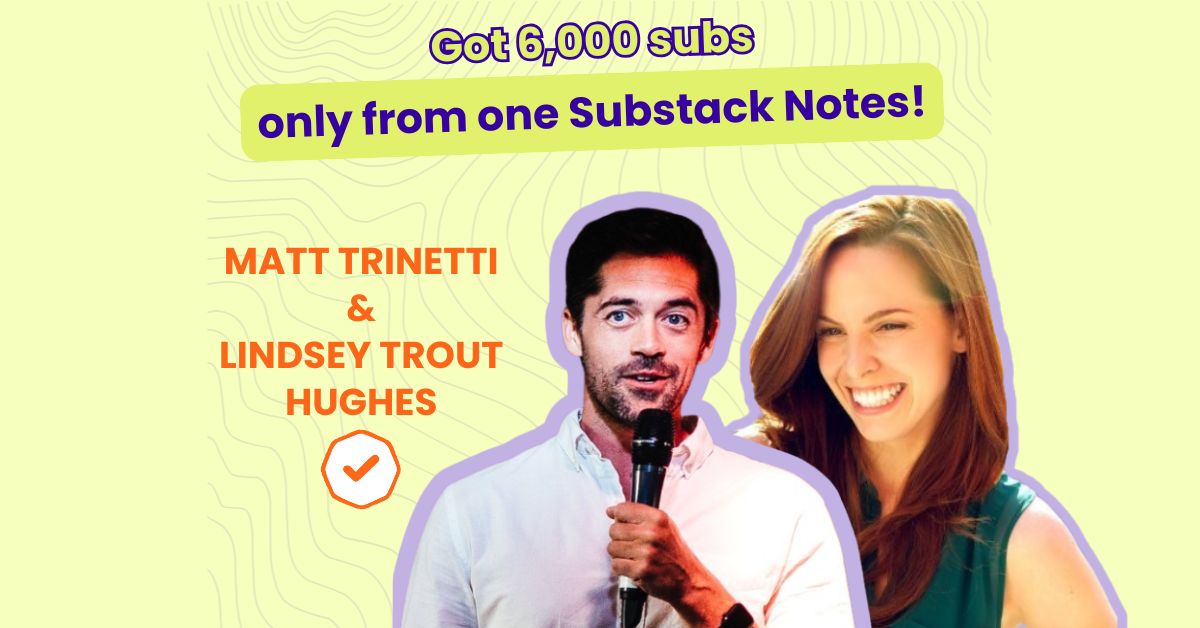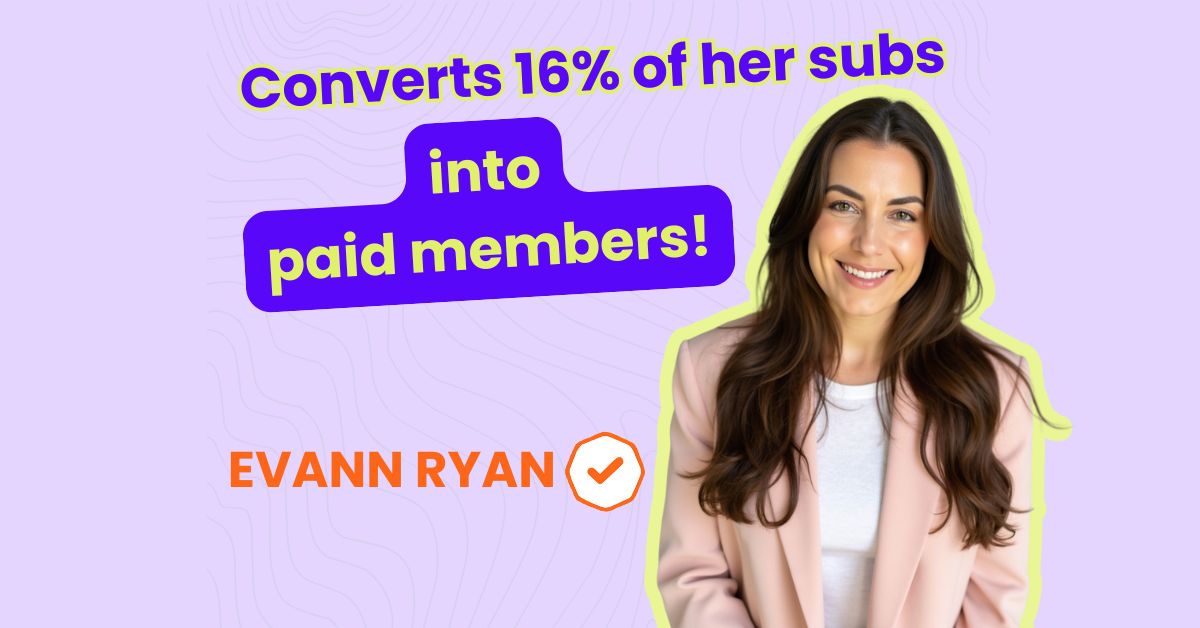Interview Date: February 18, 2024
Table of Content
- Newsletter Identity Card
- Start
- Growth
- Monetization
- Performance Measurement
- Advice to Aspiring Creators
CREATOR INTERVIEW
Richard Lazazzera is the creator of the A Better Lemonade Stand newsletter, where he shares his weekly discoveries about the online business world with his 22K subscribers.
His journey began with an e-commerce blog back in 2012, which he grew to attract monthly 250K visitors later.
After a sabbatical year where he hit pause on everything, he made a strong comeback in 2023 with a refined content strategy.
Shifting his focus areas and adapting to changes in the content creation landscape driven by the emergence of AI, he placed the newsletter at the core and focused on reactivating his list with 30K subscribers.
In today’s interview, he shared so many valuable insights about:
- Why he shifted his focus toward the newsletter
- How he managed the reactivation of his list
- Growth strategies he used to reach 30K subscribers
- A comprehensive set of tools he used to run his newsletter
- Weekly content curation system and more.
Let’s dive in!
NEWSLETTER IDENTITY CARD
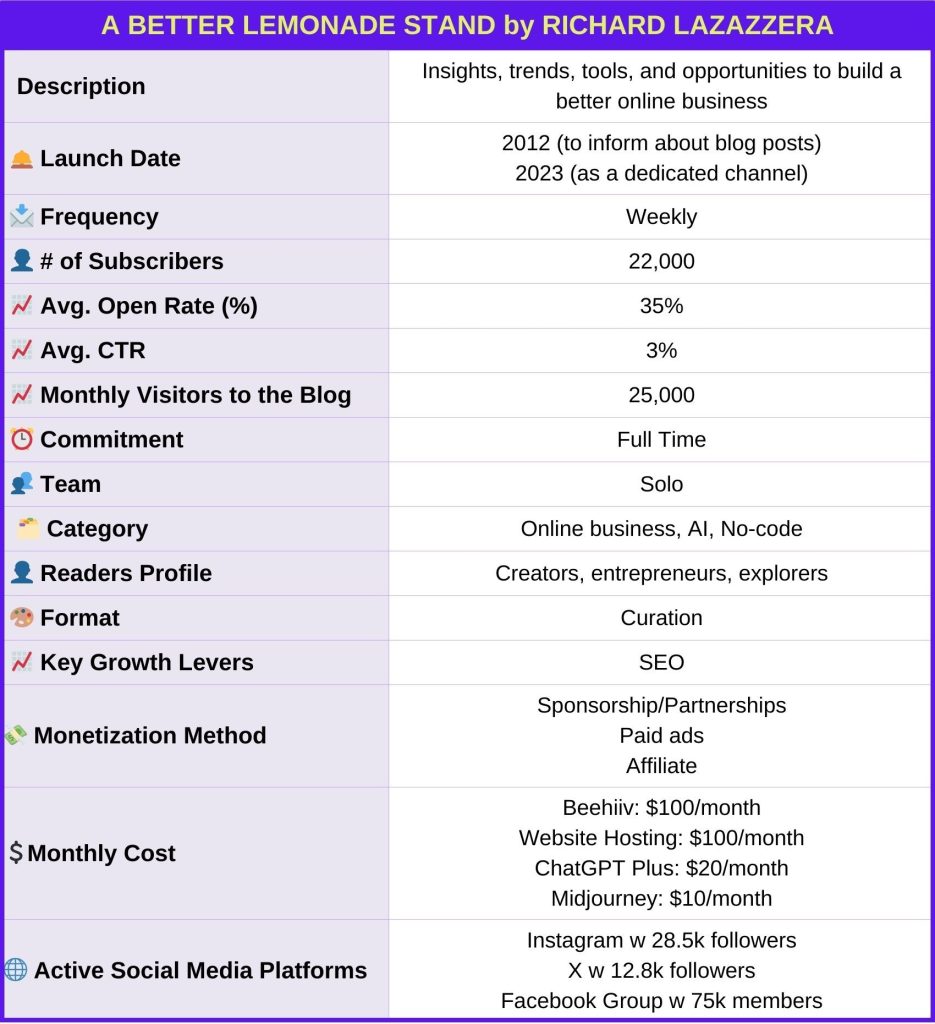
TOOL STACK
- ESP → Beehiiv*
- Writing → Notion
- Website → WordPress
- Website Analytics → Google Analytics & Monster Insights
- SEO & Keyword Research → SEO Surfer
- Design → BrandBird
- Sponsorship → Passionfroot, Paved
- Payment → Stripe
- Curation, Planning & Task Management → Notion, Feedly, Airtable
- In Airtable to extract, enhance, and automate data → DataFetcher
- Easy transfer to Notion → PopClip
- AI tools for Deeper research → Perplexity AI & ChatGPT4
- Second brain’ & research → Capacities
- Automate Research & Tasks → MindPal
- Other productivity → Raycast
MEET THE CREATOR
Welcome Richard. Let’s start with getting to know you.
Hey, I’m Richard, the founder of A Better Lemonade Stand.
“I launched it as a blog in 2012, mainly to document and share my journey in building e-commerce businesses.
Over the next eight years, it evolved into a major platform with nearly 250k monthly readers and 30k subscribers, becoming one of the largest independent e-commerce blogs.”
However, my enthusiasm for e-commerce began to wane, and my interests shifted.
One day I essentially just decided to stop.
I paused the blog, shut down the newsletter, and basically turned the lights off A Better Lemonade Stand.
This led me to take a year-long sabbatical to reflect and contemplate my next steps.
“Post-sabbatical (mid-2023), I decided to reboot A Better Lemonade Stand, shifting the focus towards digital products like newsletters, micro-apps, and membership groups, diverging from the physical e-commerce realm.”
START
You have been writing blog posts since 2012 and the newsletter was just a tool for you to tell your audience a new blog post was live each week. Last year, you changed your strategy and decided to focus almost exclusively on the newsletter.
What made you change your content strategy?
When OpenAI unveiled ChatGPT during my sabbatical, I was instantly hooked.
Over the next few months, I saw firsthand how quickly AI was progressing especially when it came to writing content.
As AI’s role in content creation grew, it became apparent to me that we’re going through a paradigm shift in content creation.
Blogging, search, and SEO are in the process of fundamentally changing, so I rather wait to see how things play out and not follow the trend of generating AI-driven, keyword-focused articles solely for traffic.
“Instead, I decided to focus on re-engaging with my existing audience and sharing my new journey.
I leveraged my 30,000+ email list for this purpose.
It was the ideal starting point due to its targeted nature, direct reach, and quick feedback loops.
This approach has enabled me to experiment with various content formats, discovering what truly resonates with my audience and getting some great early feedback.”
GROWTH
Based on your experience, what should be the right approach to starting a blog for a newsletter creator? In which cases should these two platforms go hand in hand or not?
Having a blog is definitely a plus.
It boosts your brand’s credibility and opens up more opportunities and channels for growth and revenue – think ads, sponsorships, that kind of thing.
Overall, this obviously helps you build a more robust business.
And if you do decide to blog, ranking a blog post on Google can be a game-changer, funneling a steady flow of email subscribers almost effortlessly for months (sometimes years) to come.
But it’s important to note, my experience is rooted in the pre-generative AI era, from 2012-2020.
While the fundamentals still apply, the content generation and SEO landscape have evolved significantly. So, take my advice with a grain of modern context.
Growth strategies can vary at different stages of a newsletter journey. Which strategies did you use to grow over 30,000 subscribers?
0 – 1,000 subscribers → Reddit
My very first few hundred subscribers in 2012 came from me reposting my early blog posts on Reddit.
I was able to get good early traction on the entrepreneur subreddit by trying to provide really resourceful and condensed information.
1,000 – 5,000 subscribers → Twitter
Those early subscribers followed me on Twitter as it was the main social media channel I used at the time (2012-2017).
I was really active at the time and drove a lot of impressions to A Better Lemonade Stand, and ultimately my email list.
5,000 – 10,000 → Blog / SEO
By this point, the blog posts I had been writing for the last year or so started getting traction and ranking well in Google.
This blog traffic brought a steady stream of subscribers.
10,000 – 30,000 → SEO
At this point, probably around 2017, I decided to double down on SEO and started focusing on covering blog topics for the sake of trying to rank a keyword or cluster.
Around this time, my blog traffic grew from around 60k/month to nearly 250k/month, and I grew my email list to well over 30k subscribers.
P.S. Richard currently has 22,000 subscribers since he recently deleted 8K of low and no-engagement subscribers.
What are the most effective growth strategies that you plan to multiply on?
In today’s creator economy, with AI’s growing role in content, my growth strategy involves:
- Prioritizing content quality
- Fostering deep engagement with my audience.
- Embracing collaboration opportunities with other creators and entrepreneurs.
How do you approach social media within the context of growing a content-led online business?
I’ve recently reactivated my social media accounts after a pause during my sabbatical. My focus has mostly been on reconnecting with my email list and avoiding the common pitfall of overextending on social media without seeing tangible returns.
I used to be very active on Twitter/X and still do a lot of reading there. X has really changed since Elon took over, and I think there’s a lot of potential there for discovery and collaboration with others.
I also reactivated my Instagram, which has 20k+ followers, and my Facebook Group with 75k private members.
I’m still figuring out the exact strategy I plan to use with each social channel, though.
MONETIZATION
Can you take us through your sponsorship strategy?
I rebooted the newsletter and started considering sponsors after 3-4 months.
I was mostly waiting for subscribers’ numbers to stabilize and for my domain to warm up after going cold for so long.
As you can imagine, I lost a lot of subscribers in the first few months after not sending any emails for over a year.
After the initial bumps, I decided to start accepting sponsors and advertisers.
How did you decide on ad pricing?
This was tricky because I had done sponsorships and advertisements prior, but they were almost exclusively focused on ads on the blog.
“I had no idea what to charge for a newsletter-focused sponsorship, so I started by creating an Airtable and visiting all the sponsorship and advertising pages for all the newsletters I received over a week or two.”
I had probably about 30 creators pricing for their own advertising and sponsorships.
Reviewing all the different creators’ pricing (creators with 1,500 subscribers and some with 100’s of thousands of subscribers).
I also incorporated some advice from some of the newsletter OG’s on general newsletter sponsorship pricing, CPM’s etc.
Analyzing all the data I was able to work out average ranges.
How do you find sponsors and manage the process?
I’ve used Airtable for years to manage most aspects of my business and is what I used to manage sponsorships in the past.
For 2024, I just moved to Passionfroot to manage sponsorships.
Thus far, I have been pretty lucky. My email list was big enough that once I started emailing my audience again, I had companies start to reach out with advertising inquiries.
However, sponsors and advertisers are everywhere.
Platforms like Beehiiv*, Passionfroot, and Paved all have ad marketplaces now.
There are also standalone directories like SponsorLeads, Sponsor Gap, Open Rates, and Sponsor This Newsletter.
PERFORMANCE MEASUREMENT
What is the key metric that you aim to improve in 2024 and how you plan to do that?
For the first half of 2024, my priority is ramping up engagement.
“This includes tracking metrics like clicks, email replies, survey responses, quiz interactions, and direct interactions like video calls or coffee meetups with local subscribers in Toronto.”
Interestingly, I’m aiming for a reduction in newsletter subscribers and social media followers for the next couple of quarters while I continue to refine my new direction, strategy, and market fit with my previous audience.
SYSTEM & PRODUCTIVITY
You curate lots of insights, tools, tips and tricks every week.
What is your weekly process to reach, organize and distill information?
I start with Feedly to stay updated on niche topics and keep track of my newsletter subscriptions. When I find something interesting online, I use PopClip to easily transfer it to a Notion page, which has been an efficient way to centralize raw research, data, and links.
For further organization, I funnel these links into an Airtable. Here, using the DataFetcher app within Airtable, I parse these links, extracting and summarizing data automatically. For deeper research, I turn to AI tools like Perplexity AI and ChatGPT4.
Recently, I’ve begun integrating my research into Capacities, where I’m building a comprehensive digital research database or a ‘second brain’ for digital entrepreneurs.
E-MAIL SERVICE PROVIDER
Why did you choose Beehiiv? Pros and cons?
I chose Beehiiv* for its innovative take on newsletters, especially its emphasis on tools for building a business around them.
Its user-friendly interface, reminiscent of Notion, is a significant improvement over traditional email services.
Additionally, Beehiiv’s early-stage but promising capabilities in monetization and sponsorship workflows really caught my attention.
NEWSLETTER EXPERIENCE
How did building A Better Lemonade Stand contribute to your life professionally and personally?
“Starting A Better Lemonade Stand completely changed my life. Professionally and personally.“
In its first year, it caught Shopify’s eye, leading to an exciting stint on their Growth team during their early days and IPO. That experience, especially being there for their IPO, was incredible and life-changing on its own.
“After I left Shopify two years later to refocus back on A Better Lemonade Stand, I grew the newsletter to over 30k subscribers and 250k monthly readers on the blog.
This didn’t just boost my business and career; it massively expanded my network and really deepened my understanding of the digital world.”
On the personal front, it’s been a remarkable ride.
I got to live the ‘4-Hour Work Week‘ dream (fun, but not for me), explored the digital nomad lifestyle in stunning locales, and connected with people who were once just inspiring figures on the internet.
What is the most challenging part of operating a newsletter and how do you handle it?
“The most challenging part of running a newsletter is consistently delivering high-quality, engaging content that resonates with your audience.”
To tackle this, I rely on a combination of strategies:
1. Audience Feedback: Regularly seeking and incorporating subscriber feedback helps tailor content to their interests and needs.
2. Content Planning: A well-thought-out content calendar aids in maintaining a steady flow of ideas and prevents last-minute rushes.
3. Leveraging Tools: Using tools like AI for content ideas, analytics for understanding reader preferences, and automation for efficient distribution.
4. Continual Learning: Staying updated with industry trends and new technologies to keep the content fresh and relevant.
If you had a chance to start over A Better Lemonade, what would you do differently?
In essence, I am in the process of starting A Better Lemonade Stand anew.
This time, my approach is more personal, with a stronger focus on engaging and connecting with my audience.
“Looking back, A Better Lemonade Stand was mainly a resource site.
If I had the chance to do things differently from the beginning, I would emphasize building a community right from the start.
Community engagement is crucial, and establishing a deep connection with the audience early on would have greatly enhanced the platform’s growth and influence.”
My current goal is to evolve it into a vibrant, inclusive community where digital entrepreneurs can come together to connect, build, and collaborate.
ADVICE TO ASPIRING CREATORS
What would it be if you had the right to give one piece of advice to aspiring newsletter creators?
If I could offer one piece of advice to aspiring newsletter creators, it would be simply to start. Take action.
“Action creates opportunity.”
Whenever you create something, no matter how small, and put care and attention into it, people take notice. This is how new opportunities arise.
Too many people, myself included at times, get caught up in choosing the perfect niche, platform, or channel, or worry about others’ opinions, leading to inaction.
Remember, every week you’re not sending out a newsletter is a missed opportunity.
FAVORITE NEWSLETTERS
What are your favorite newsletters that you can’t wait for the next issue?
I have a few favorite newsletters that I always look forward to:
- Katt Risen’s NoCode Exits
Katt does an excellent job with interviews and breakdowns of online businesses. It’s a fantastic resource for anyone keen on building products with no-code tools, really standing out in this niche. - The Steal Club by Alex Llull
This newsletter is about growing and monetizing your audience by learning from top creators. Alex’s unique approach, combined with his intriguing ideas and branding, makes it a must-read. - Zoe’s Build & Launch
Zoe Chew offers valuable insights into Product Ideation, Validation, and MVPs. It’s a great resource for product managers, entrepreneurs, and founders who want to build monetizable products online. - Juicy Ideas
Hazel Lim provides a deep dive into the growth strategies of top indie makers. It’s ideal for anyone looking to understand the journey from concept to significant revenue, packed with actionable insights.
Where to find Richard Lazazzera and his work
Subscribe to A Better Lemonade Stand!
*indicates affiliate links

